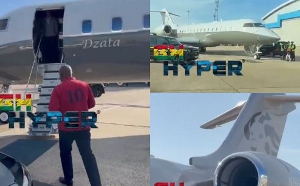The Authority of Heads of State and Government of the Economic Community of West African States (ECOWAS), has given Mali a one-week period effective September 15, 2020, to either form a transitioning government or face mixed sanctions.
The sanctions include the closure of all land and air borders, freezing of all financial transactions, and freezing of economic and trade flows between ECOWAS Member States and Mali, with the exception of basic essentials, medication and supplies and equipment for the fight against COVID-19, petroleum products and electricity.
Madam Shirley Ayorkor Botchwey, the Minister of Foreign Affairs and Regional Integration said this at a media briefing in Accra on Wednesday.
The decision was arrived at in a Consultative Meeting convened by the Chair of the Authority, President Nana Addo Dankwa Akufo-Addo, and members of the National Committee for the Salvation of the People (CNSP), Mali, on September 15, 2020, at Peduase in the Eastern Region on the political situation in Mali. Mali's President, Mr Ibrahim Boubacar Keïta was overthrown on August 18, 2020.
He won a second term in elections in 2018, however, there was anger over corruption, the mismanagement of the economy and a dispute over legislative elections.
This prompted several large protests in recent months and following his overthrow, Mr Keïta was detained by the soldiers and later freed.
This was the fourth coup in the West African state since it gained independence from France in 1960.
Hence, the meeting among others matters, aimed at expediting the process for the establishment of a Transitional Government and the restoration of constitutional order in Mali.
Leaders who participated in the meeting were Mr Roch Marc Christian Kabore, President of Burkina Faso, Alassane Ouattara, President of the Republic of Cote d’Ivoire, Professor Alpha Conde, President of the Republic of Guinea, and Mr Mahamadou Issoufou, the President of the Republic of Niger.
Others were Mr Macky Sall, the President of the Republic of Senegal, Mr Faure Essozimna Gnassingbe, President of the Togolese Republic, and Mr Yemi Osinbajo, the Vice President of the Federal Republic of Nigeria.
The decisions stipulated that the President and Prime Minister of the transitional government must be civilians and the nominations of these two key personalities must be done immediately.
The transition Vice President provided for in the Transition Charter, it said, should not under any circumstances assume the role of the Transition President, and the CNSP would be dissolved immediately the civilian transition government was in place.
It was also decided that the transition period would be 18 months maximum, with effect from September 15, 2020.
Madam Botchwey said following extensive deliberations on the architecture and road map for the transition presented by the delegation of the CNSP led by Colonel Assimi Goita, the Heads of State made a number of decisions.
Madam Botchwey said once a civilian-led transition government had assumed office, ECOWAS within the context of its protocols, would fully assist Mali to return to constitutional rule.
Sanctions, she said, would also be lifted immediately the Transition President and Prime Minister were appointed.
The ECOWAS Moderator, Mr Goodluck Jonathan, Former President of Nigeria, was charged to undertake a mission to Mali within a week to assess the status of implementation of the decisions of the Authority.
Madam Botchwey reiterated that the step undertaken by the Authority followed the reaffirmation of the Authority at the 57th Summit of the Authority of Heads of State and Government of ECOWAS, to ensure that there was a swift restoration of constitutional order in Mali.
Madam Anne Sophie Ave, the Ambassador of France to Ghana in an interview with the Ghana News Agency, said Ghana and her President Akufo-Addo were known for their record of enforcing democracy, hence, she was optimistic that the Authority under the Chairmanship of President Akufo-Addo, could help to revive Mali.
She said a country with a leadership attained from a military force, often lost the confidence of development partners and other sister countries to offer support or to invest in the country.
General News of Thursday, 17 September 2020
Source: GNA













